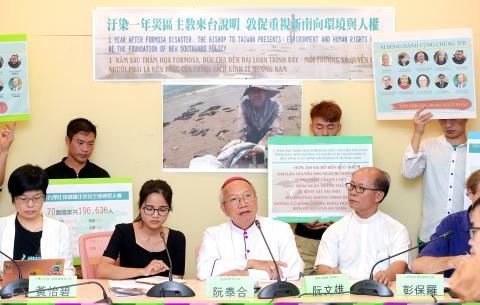Human rights and environmental considerations should be incorporated into the government’s New Southbound Policy, a group of Taiwanese and Vietnamese campaigners said yesterday, proposing measures to remedy the problems revealed by a major environmental scandal.
“The New Southbound Policy only focuses on Taiwan’s development — not the development of Southeast Asia as a whole — and it does not place any emphasis on environmental protection and societal growth. The policy needs to include these kinds of issues to make sure that investors are accountable,” Vietnamese Catholic Bishop Nguyen Thai Hop said.
Nguyen’s Vinh diocese encompasses a swathe of the seacoast affected by a mass fish die-off last year that was linked to pollution caused by a steel plant owned by a Vietnamese subsidiary of Formosa Plastics Group.

Photo: Chang Chia-ming, Taipei Times
He made the remarks at a news conference attended by Vietnamese migrant workers, after presenting a petition to the Presidential Office, saying that stricter overseas investment regulations could have prevented the disaster and would enable the nation to differentiate itself from China.
“This would help prevent Taiwanese firms from being targeted during anti-China riots,” he said, referring to riots in 2014 when more than 100 Taiwanese factories were attacked by people protesting against Chinese activities in the South China Sea.
Safeguards do not need to be overly strict, as long as they are reasonable, fair and just, he said.
Environmental Jurists Association secretary-general Lin Jen-hui (林仁惠) called for amendments to the Statute for Industrial Innovation (產業創新條例) to grant the Ministry of Economic Affairs the authority to bar Taiwanese overseas investment projects that could violate the rights of workers and people in the host nation.
Companies should be required to submit human rights impact assessment reports along with their applications and the government should have the power to revoke investment permits of companies that are found to have reneged on their pledges, Lin said.
PENALTY
“Any company that violates their promises should face a fine, unlike the current situation where the government’s hands are tied,” she said.
Covenants Watch chief executive officer Huang Yi-bee (黃怡碧) said that citizens of foreign states should be allowed to seek redress and compensation in Taiwanese courts for human rights violations committed by Taiwanese firms abroad.
Nguyen called on the government to put pressure on Formosa Plastics to increase the compensation offered to people affected by the mass fish die-off and require the Vietnamese government to clarify how the money would be distributed, such as publicizing the amount of compensation provided to each person.
“The US$500 million compensation, to which the Vietnamese government agreed, was not approved by the public and did not go through a court — it is a meager amount, given the number of people affected,” he said, adding that the Catholic Church is in the process of aggregating victims’ claims to estimate the amount of compensation required.
Huang said that the church has become a conduit for the victims to express their opposition to the Vietnamese government’s handling of compensation, because many of them are Catholics and the government is unwilling to crack down on the church.

US President Donald Trump said "it’s up to" Chinese President Xi Jinping (習近平) what China does on Taiwan, but that he would be "very unhappy" with a change in the "status quo," the New York Times said in an interview published yesterday. Xi "considers it to be a part of China, and that’s up to him what he’s going to be doing," Trump told the newspaper on Wednesday. "But I’ve expressed to him that I would be very unhappy if he did that, and I don’t think he’ll do that," he added. "I hope he doesn’t do that." Trump made the comments in

NOT AN OPENING: Trump’s violation of international law does not affect China’s consideration in attacking Taiwan; Beijing lacks capability, not precedent, an official said Taiwanese officials see the US’ capture of the president of Venezuela as a powerful deterrent to Beijing’s aggression and a timely reminder of the US’ ability to defeat militaries equipped with Chinese-made weapons. The strikes that toppled Venezuelan President Nicolas Maduro signaled to authoritarian leaders, including Chinese President Xi Jinping (習近平), US President Donald Trump’s willingness to use military might for international affairs core to US interests, one senior official in Taipei’s security circle said. That reassured Taiwan, the person said. Taipei has also dismissed the idea that Trump’s apparent violation of international law could embolden Beijing, said the official, who was not

A cold surge advisory was today issued for 18 cities and counties across Taiwan, with temperatures of below 10°C forecast during the day and into tonight, the Central Weather Administration (CWA) said. New Taipei City, Taipei, Taoyuan and Hsinchu, Miaoli and Yilan counties are expected to experience sustained temperatures of 10°C or lower, the CWA said. Temperatures are likely to temporarily drop below 10°C in most other areas, except Taitung, Pingtung, Penghu and Lienchiang (Matsu) counties, CWA data showed. The cold weather is being caused by a strong continental cold air mass, combined with radiative cooling, a process in which heat escapes from

Snow this morning fell on Alishan for the first time in seven years, as a strong continental cold air mass sent temperatures plunging across Taiwan, the Central Weather Administration (CWA) said. The Alishan weather station, located at an elevation of about 2,200m in central Taiwan, recorded snowfall from 8:55am to 9:15am, when the temperature dropped to about 1°C, the CWA said. With increased moisture and low temperatures in the high-altitude Alishan area, the conditions were favorable for snow, CWA forecaster Tsai Yi-chi (蔡伊其) said. The last time snow fell at the Alishan weather station was on Jan. 10, 2018, while graupel fell there